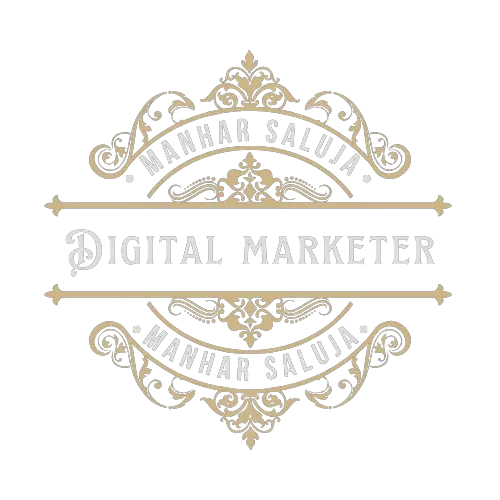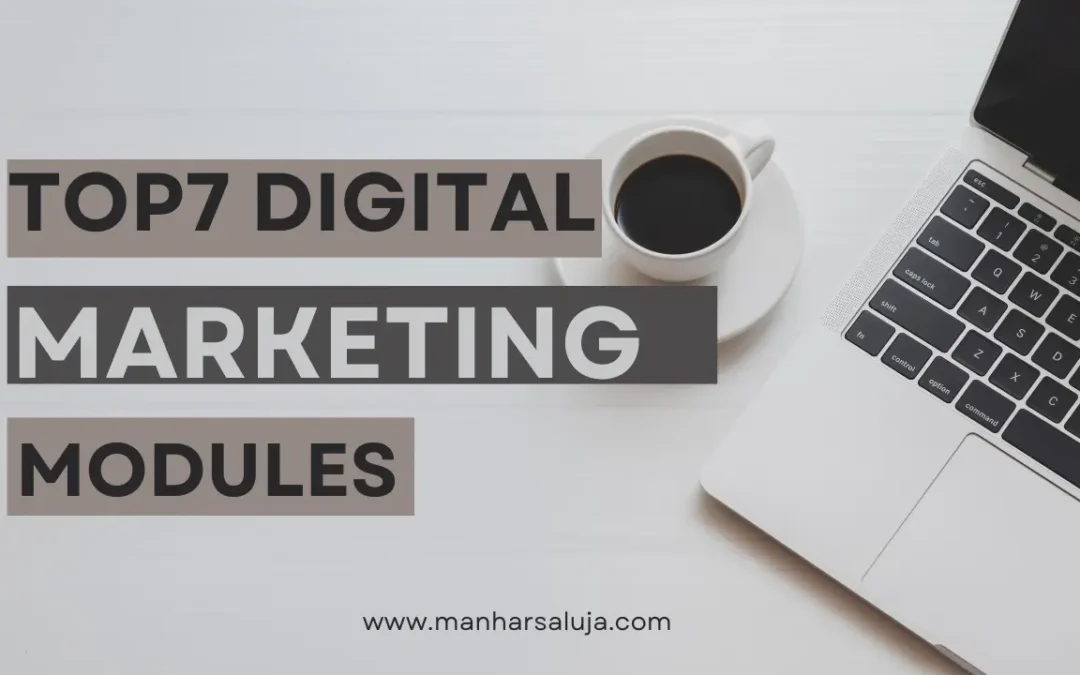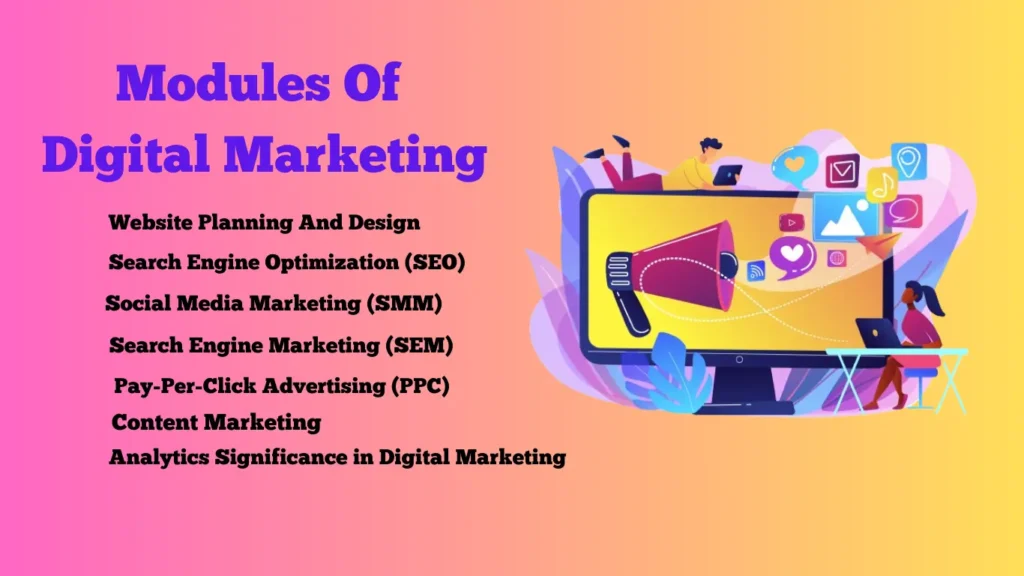
What are the modules of Digital Marketing 2024?
Digital marketing is all about using the internet to promote products, services, or brands.
It includes different online strategies and tools, like search engines, social media, email, and other online platforms to get the word out there.
Importance of Digital Marketing In today’s world, digital marketing is super important for businesses to reach their goals.
It provides a cost-effective and measurable way to engage with customers, increase brand awareness, and increase conversions.
To join them, you need to know about the modules of digital marketing that you can use to grow.
This section provides an overview of the key elements or modules that make up the digital marketing field and highlights the need for a comprehensive strategy to realize the full potential of online marketing.
After learning about digital marketing, it’s important to understand its different parts and how they work. In this blog, we talked about modules like SEO, SEM, SMM, and more.
Table of Contents
Modules Of Digital Marketing
Modules of Digital Marketing are important that help businesses be online and connect with people. Analytics is really important because it helps us understand how people behave online and if our strategies are working.
Influencer marketing is about using popular online people to talk about products and services. Email advertising is still useful for reaching out to new customers directly.
A well-designed website is like the backbone of your digital marketing strategy. It serves as the foundation on which all your online efforts are built.
User experience (UX) and user interface (UI) design play a crucial role in shaping the overall usability and effectiveness of your website.
Content writing is important for making interesting and relevant content that people like to read.
Social media marketing (SMM) helps businesses connect with customers on platforms like Facebook, Instagram, and Twitter, building a loyal following.
Search engine marketing (SEM) and search engine optimization (SEO) help businesses get noticed on search engines like Google, bringing in more visitors through both free and paid methods.
PPC (Pay-Per-Click) advertising is when you pay to show your ads online and you pay each time someone clicks on them.
Instead of waiting for people to find your website naturally, PPC lets you bring visitors directly to your site.
Its main job is to get more people to visit your website by showing ads to people who are already interested in what you offer.
All these parts work together to make digital marketing effective for businesses, helping them succeed online.
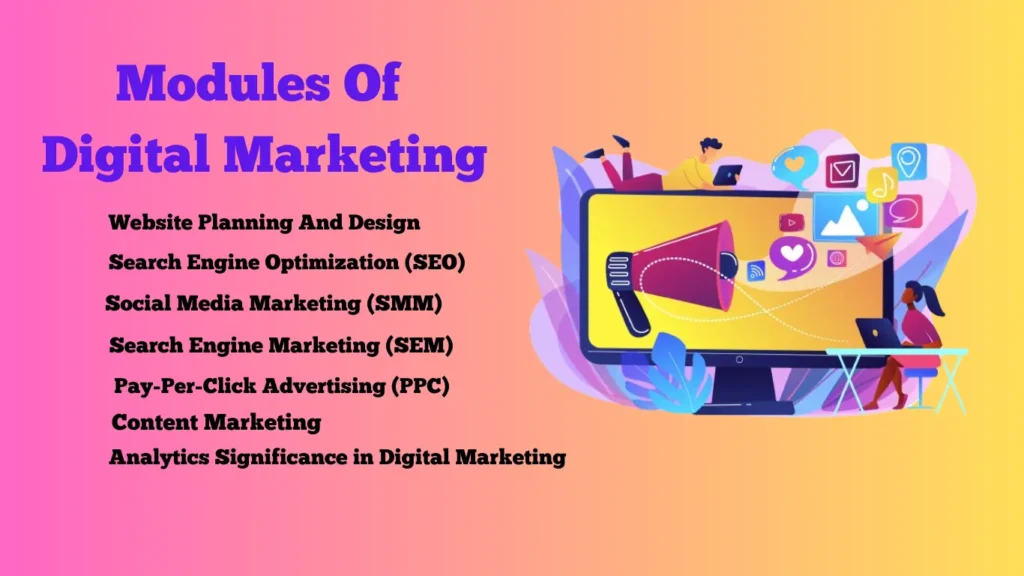
Website Planning and Design Modules
Website planning and design modules are essential modules of digital marketing that focus on creating a user-friendly, visually appealing, and optimized website to attract and engage visitors, drive conversions, and achieve business goals.
- Goal Identification: Determine the purpose and goals of your website. Whether it’s to sell products, generate leads, or provide information, clarifying your objectives guides the design process.
- Target Audience Analysis: Understand your target audience’s preferences, behaviors, and needs. Tailoring your website design to meet their expectations improves user experience and engagement.
- Content Strategy: Plan the content structure and organization of your website. This includes defining page layouts, navigation menus, and the types of content (text, images, videos) to be included.
- User Experience (UX) Design: Focus on creating a seamless and intuitive browsing experience for visitors. This involves optimizing website usability, accessibility, and interaction design elements to enhance user satisfaction.
- Visual Design: Develop a visually appealing and consistent design that reflects your brand identity. This includes choosing color schemes, typography, imagery, and other visual elements to create a cohesive look and feel.
- Responsive Design: Ensure your website is optimized for viewing across different devices and screen sizes. Responsive design techniques adapt the layout and content of your website to provide an optimal viewing experience on desktops, laptops, tablets, and smartphones.
- Search Engine Optimization (SEO): Incorporate SEO best practices into the website design to improve its visibility and ranking in search engine results. This includes optimizing meta tags, headers, URLs, and internal linking structures to enhance organic search visibility.
- Security Measures: Implement security measures to protect your website from cyber threats and ensure data privacy. This includes installing SSL certificates, using secure login mechanisms, and regularly updating software to prevent security vulnerabilities.
Search Engine Optimization (SEO)
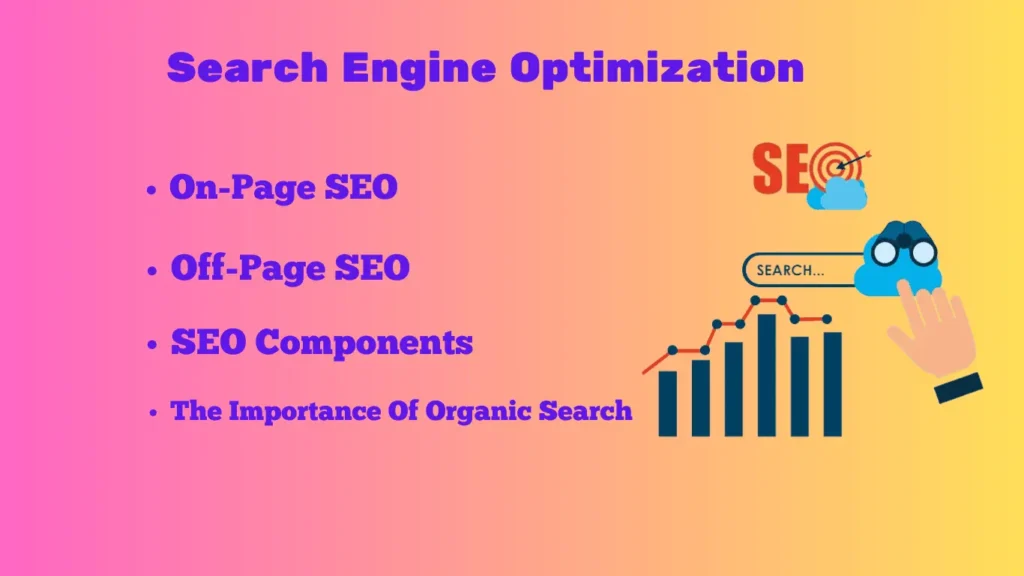
SEO is the best Modules of Digital Marketing. It’s all about making your website easier to find on search engines without paying for ads.
- On-Page SEO Strategies: This is all about making specific web pages awesome for search engines. It includes stuff like using the right words in links, titles, descriptions, headers, and web addresses.
- Off-Page SEO Strategies: This is about doing things outside your website to make search engines like you more.
- It includes stuff like getting other websites to link to yours and being active on social media.
- Essential SEO Components: These are the key parts of search engine optimization (SEO) that you need to focus on to improve your website’s visibility and ranking on search engine results pages (SERPs).
- The Importance of Organic Search: Think about how being at the top of regular search results can bring many people to your website and make others trust it more.
Search Engine Marketing (SEM)
Search Engine Marketing (SEM): One important modules of digital marketing is Search Engine Marketing (SEM).
A Difference Between SEO and SEM is SEO focuses on getting your website to show up higher in search results naturally,
While SEM uses paid methods to make your website more visible in search results.
Understanding SEM is important for businesses that build a strong online presence and get specific people to visit their websites.
Social Media Marketing(SMM)
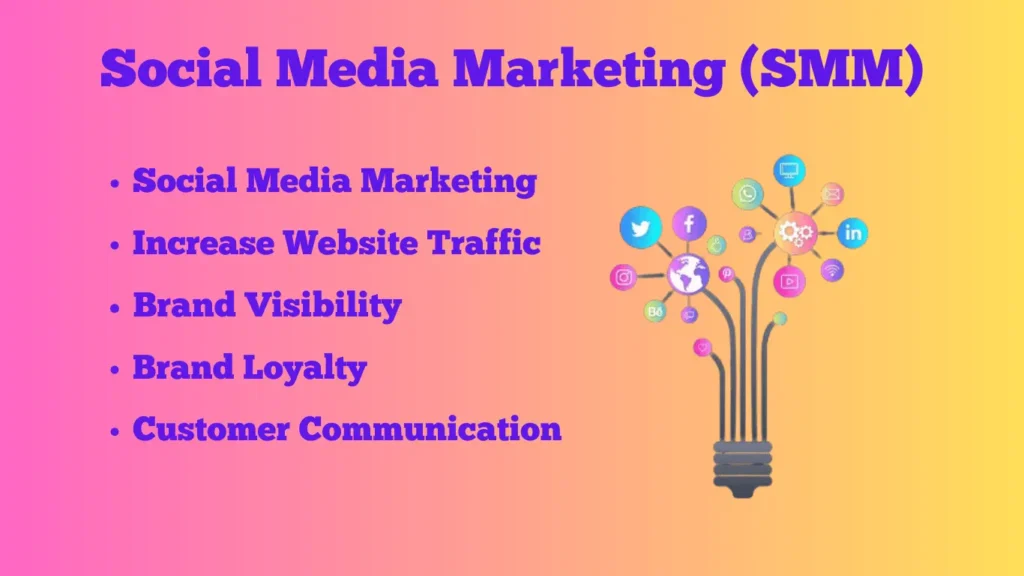
Marketing on Social Media (SMM) – Social media marketing means using platforms like Facebook, Instagram, Twitter, and YouTube to create and share content.
The goal is to promote and build a brand. Social media is a key part of digital marketing, where businesses post text, photos, videos, and other cool stuff to engage with customers.
- Social Media Marketing: It is all about connecting with lots of people on social media platforms. These platforms have billions of users, so businesses can talk to a big audience and make friends with them.
- Increase Website Traffic: Social media marketing (SMM) can help bring more people to a website by using smart strategies. This can lead to more potential customers and sales.
- Brand Visibility: When you share interesting stuff and talk to people on social media, social media marketing (SMM) helps more people know about and recognize your brand.
- Brand Loyalty: When people talk about and support a brand on social media, it helps create strong loyalty to that brand.
- Customer Communication: Social media lets companies talk directly to their customers, answering questions, listening to feedback, and fixing problems.
Platforms for Social Media
- Facebook: With lots of people using it, Facebook is a great place for businesses to connect with their audience using groups, pages, and paid ads.
- Instagram: Instagram is great for sharing pictures and videos. Businesses use it to grab their followers’ attention and inspire them.
- Twitter: Well-known for its real-time updates, Twitter is a place to share short messages for interaction and timely news.
- LinkedIn: it is a website where professionals connect. It’s helpful for businesses that want to market to other businesses.
Content Writing

Content writing is one of the top modules of digital marketing. One powerful strategy in digital marketing is content marketing. It keeps customers engaged and builds trust and loyalty to brands.
To reach the right audience, content marketing involves making and sharing valuable and relevant content regularly. It uses different ways like websites, social media, blogs, and videos to connect with people and encourage them to do important things.
Build relationships with viewers: Content helps brands connect deeply with their audience, content provides a forum for deep and meaningful connection. Businesses can build lasting relationships by creating authentic connections with their audiences by providing content relevant to their needs and interests.
Be confident and strong: High-quality training materials can make a brand a leader in its industry. Businesses can earn trust and credibility by creating well-researched and smartly written content. This helps them become a trusted source of information for their audience.
Changes for driving: Suggestions can boost sales, by guiding potential customers through the buying process and encouraging them to come back again. Companies can sway buying decisions and make customers more loyal by giving helpful advice and solving their problems.
Email Marketing
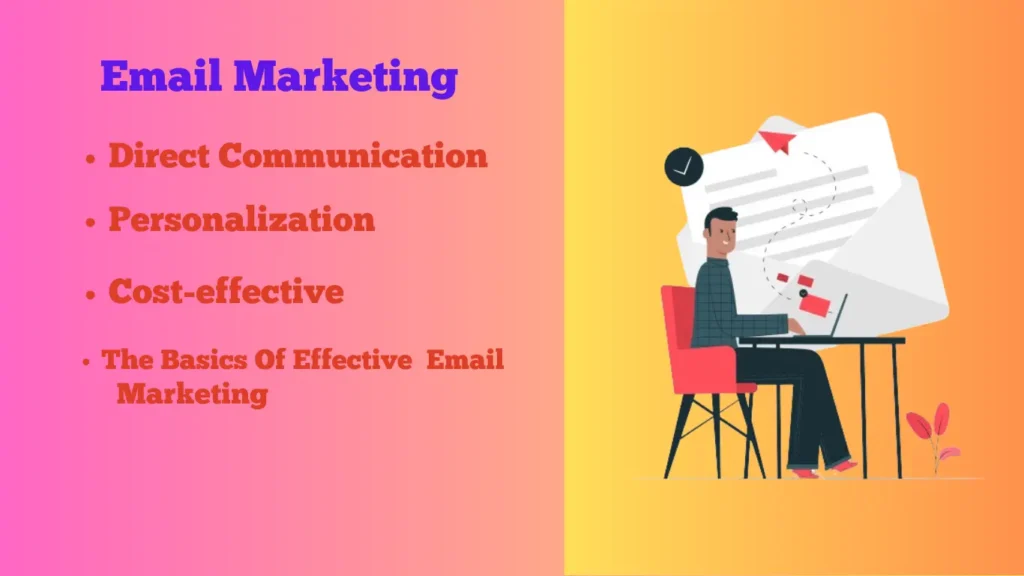
Email marketing: Email marketing remains a best modules of digital marketing because it helps boost sales, keep customers loyal, and connect with them. This detailed guide to digital marketing modules will explore the benefits of email marketing. It covers everything from building email lists to running effective campaigns and measuring success.
- Direct Communication: Talk straight to your audience and skip the uncertainty of social media.
- Personalization: The goal of personalization is to create more engaging and effective email campaigns by making recipients feel valued and understood.
- Cost-effective: Email marketing is a budget-friendly way to reach many people compared to traditional advertising.
The Basics of Effective Email Marketing
- Authorized: Get permission before sending an email to make sure you follow the policy.
- Segmentation: Divide your audience into smaller groups based on how they act, who they are, or what they like to hear about.
Mobile Marketing
Mobile marketing is super important for reaching people who use their smartphones lot in today’s changing digital world. It includes things like showing ads based on where someone is, promoting apps, and sending targeted messages.
Mobile marketing uses tactics like mobile apps, text message marketing, and websites that work well on phones. It’s all about making sure people have a good experience no matter what device they’re using.
In today’s world where everyone is bonded to their phones, adding mobile marketing to your overall digital marketing plan is important for reaching as many people as possible.
Influencer Marketing
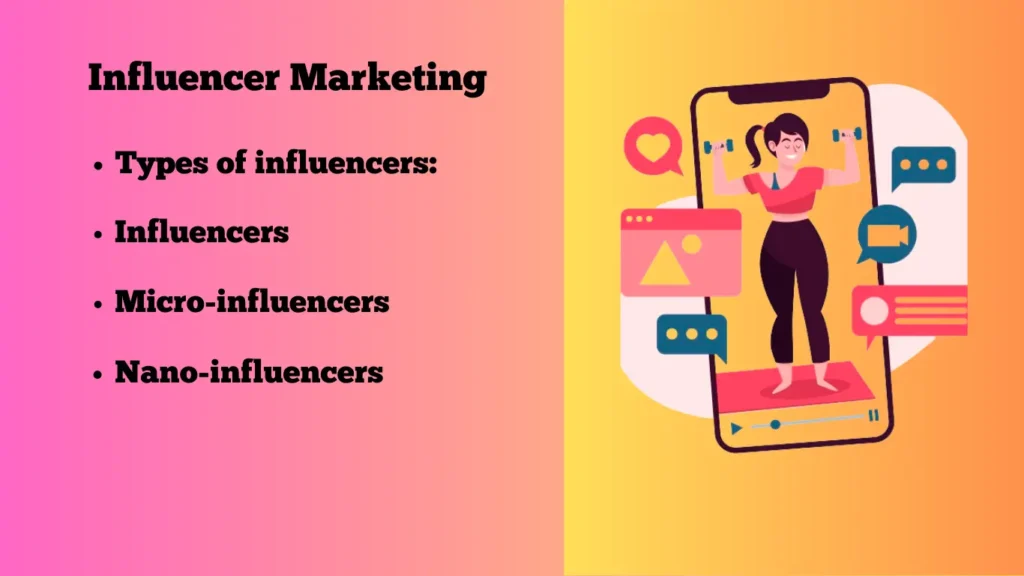
Influencer marketing is when businesses team up with popular people, called “influencers,” who have many followers. These influencers are experts in their area and can persuade their followers to buy products or services from the businesses they promote.
Types of influencers:
- Influencers: celebrities and famous people with lots of fans.
- Micro-influencers are individuals with a smaller but highly engaged group of followers in a specific area of interest.
- Nano-influencers are individuals with a small number of followers, but they hold considerable command over a particular group of people.
Adherence to Brand Principles:
- Matching Brand Values: Brands should pick influencers who believe in the same things they do before teaming up. Building trust with an influencer’s audience requires authenticity.
- Audience Match: For effective communication, the influencer’s followers should be similar to the brand’s target audience.
- Partner Negotiation: It’s important to talk about what needs to be done, what’s expected, and how much the influencer will be paid. This could include sponsored posts, using products in their content, or becoming a long-term ambassador.
Pay-Per-Click advertising (PPC)
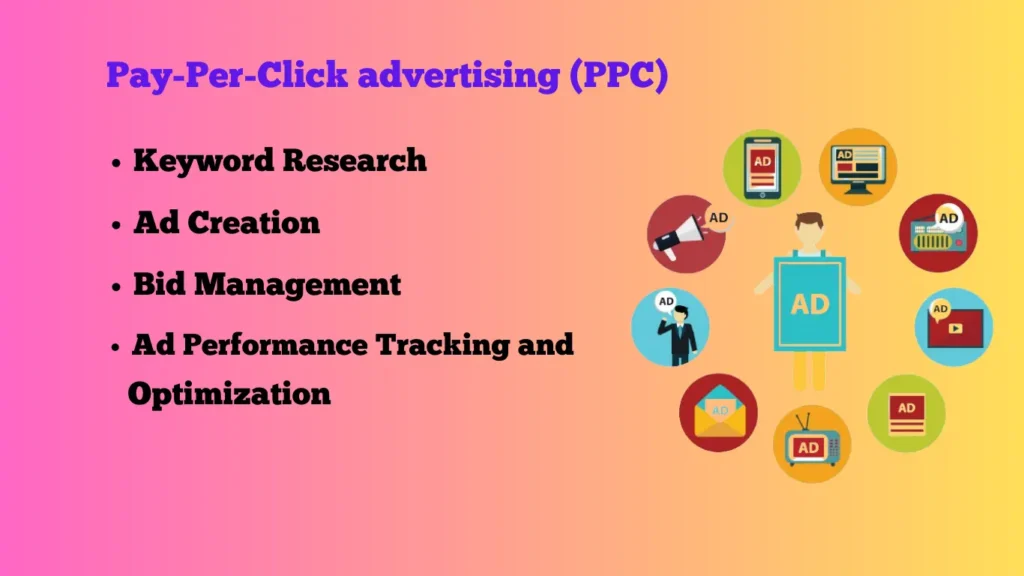
PPC (Pay-Per-Click) advertising is one of the essential modules of digital marketing that involves advertisers paying a fee each time their ad is clicked. It’s a way to buy visits to your website, rather than earning them organically.
Within PPC advertising, there are several key components or modules:
- Keyword Research: Find the words people use when looking for products or services like yours. This helps create ads that reach the right audience.
- Ad Creation: Make ads with catchy headlines and messages that make people want to click. Using the right keywords in your ads makes them more relevant and effective.
- Ad Targeting: Choose who sees your ads based on factors like age, location, and interests. You can also target people who have shown interest in your business before.
- Bid Management: Decide how much you’re willing to pay for your ads to appear. Managing bids effectively helps you get the most out of your budget.
- Ad Performance Tracking and Optimization: Keep an eye on how your ads are doing and make changes to improve them. Tracking metrics like clicks, conversions, and costs helps you get better results.
Overall, PPC modules of digital marketing provide businesses with a powerful tool to drive targeted traffic to their websites, increase brand visibility, and generate leads or sales. Using PPC advertising effectively can help businesses reach their goals and grow online.
Analytics Significance in Digital Marketing
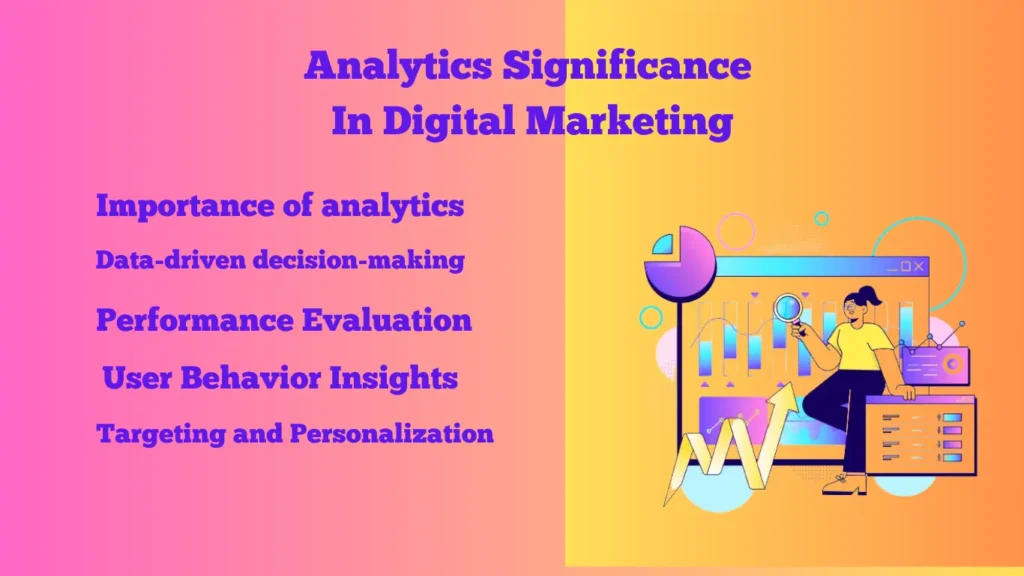
In digital marketing, analytics and data analysis are crucial because they help companies understand how they’re doing, improve their strategies, and make smart choices. Digital marketing analytics involves collecting, analyzing, and understanding data about how people interact online. This helps businesses see what’s working and what needs improvement.
The importance of analytics in digital marketing
- Data-driven decision-making: Analytics helps companies make decisions based on real data instead of just guessing. This way, they can make their marketing strategies more accurate and effective.
- Performance Evaluation: Analytics helps businesses see how well their digital marketing channels, campaigns, and projects are doing. This helps them determine what’s going well and what needs improvement.
- User Behavior Insights: Analytics tools tell us how people behave on a website, like which pages they visit and what they do there. This helps make the website better for users.
- Targeting and Personalization: By looking at user data, companies can make their marketing fit certain groups better. This makes campaigns more personal and aimed at specific groups, making it more likely that people will get involved and buy things.
Conclusion
Modules of Digital Marketing Understanding the various modules discussed in this detailed guide is crucial for companies aiming to thrive in the fast-evolving realm of digital marketing, where strategies evolve as rapidly as technology.
Each aspect of a robust digital marketing plan, ranging from search engine optimization (SEO) to innovative advancements like blockchain integration, contributes a unique element to the overall strategy.
As we wrap up our exploration, let’s recap the key insights gained and emphasize the enduring principles that form the foundation of mastering digital marketing. These encompass all the modules of digital marketing.
WHY SHOULD I CHOOSE DIGITAL MARKETING?
Digital marketing is becoming really popular, and more and more people want it. If you work in digital marketing, you can grow your career and do lots of different jobs in a company.
WHAT IS AN EXAMPLE OF DIGITAL MARKETING?
Search engine optimization, social media marketing, search engine marketing and email marketing are some examples of digital marketing.
WHAT IS SEO?
Search Engine Optimization or SEO is the process of optimizing your website so that it ranks at the top of Google.
WHAT ARE THE KEY FACTORS OF SEO TO BE CONSIDERED IN ONLINE MARKETING?
Some of the important key factors of SEO are:
1. Local SEO
2. On-page & Off-page
3. Keyword research
4. Technical SEO
5. SEO audit
6. Link building
WHERE YOU CAN LEARN SEO?
You can learn SEO on Modules of Digital Marekting by enrolling blog Modules Of Digital Marketing2024 by Manhar Saluja
HOW GOOD IS DIGITAL MARKETING AS A CAREER?
Choosing a career in digital marketing can be a really good idea.
1. High Demand
2. Diverse Opportunities
3. Flexibility
4. Creativity
5. Measurable Results
The average salary of a fresher in this field is 2.5 L- 5. 00 L they possess the right skills and knowledge
